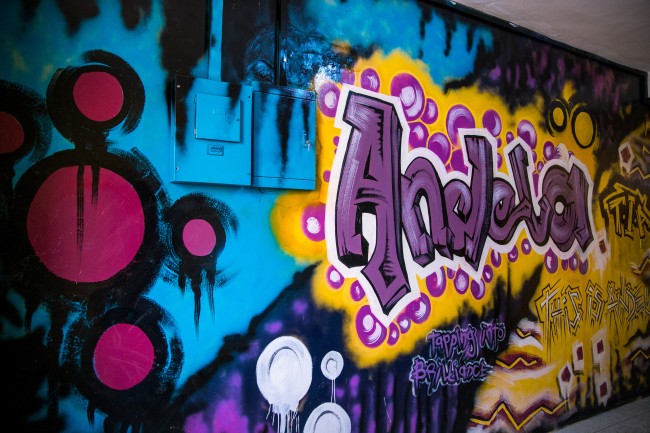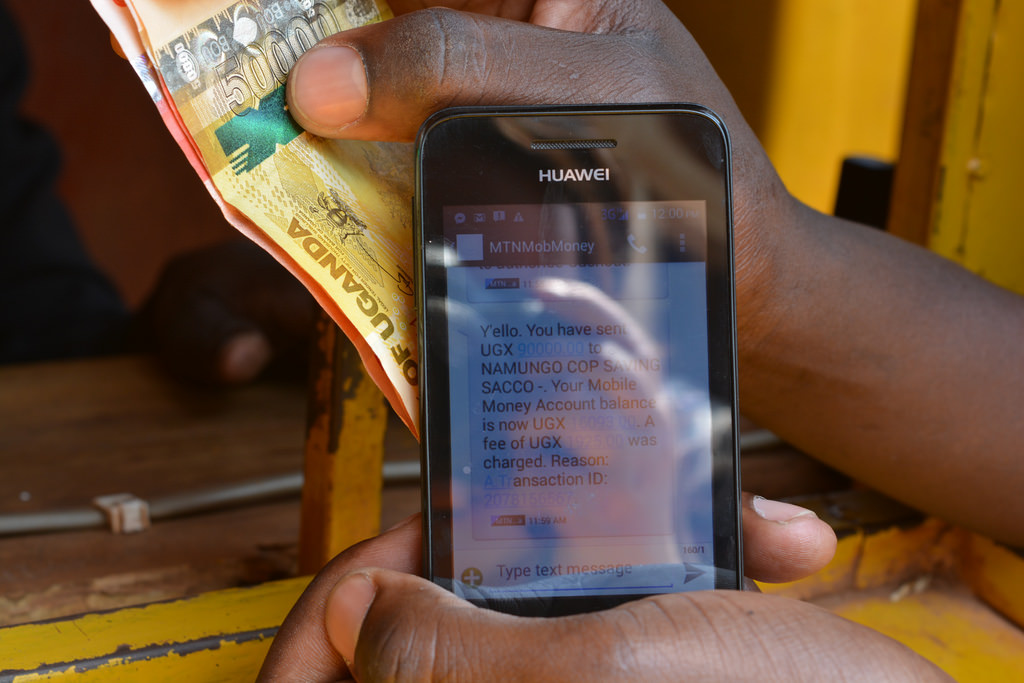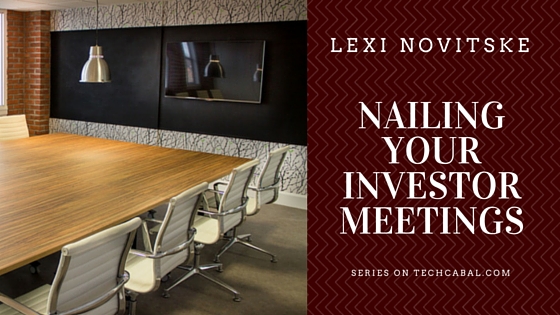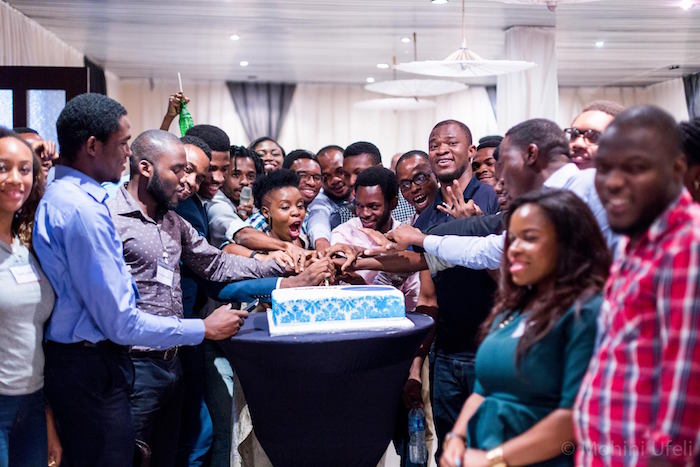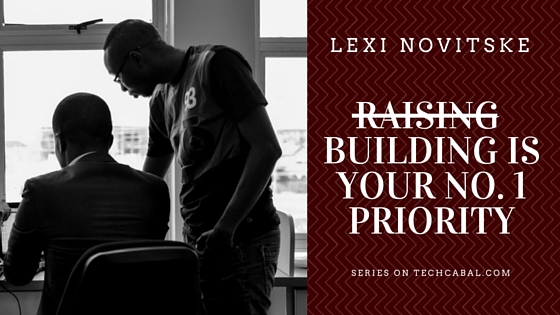Editor’s note: You probably already know that talent accelerator, Andela raised $24 million in a funding round led by Mark Zuckerberg and Priscilla Chan. What you may not know is that media coverage of the funding sparked a controversy on Nigerian Tech Twitter about its founding narrative. This morning though, Iyinoluwa Aboyeji, Andela’s co-founder set the record straight with a 5-minute read on his Medium page. Here it is, from the horse’s mouth.
[separator type=”thin”]
Last week was a huge milestone for African startups.
A company jointly founded in Nigeria and the U.S. is getting a significant investment and attention from Mark Zuckerberg — one of the most important people in Silicon Valley. During such a pivotal moment, it is important for me to share Andela’s history and inspire many other entrepreneurs through my story of failure, success and collaboration.
In 2013, Ian Carnevale, Nadayar, Brice and I started Fora, a distance learning platform for African universities. We reached out to Jeremy Johnson because of the similarities between his company at the time, 2U, and what we were hoping to build in Africa. We met at his office in NYC and then stayed in touch. From time to time, I would ask for feedback and he became my mentor.
In early 2014, it became clear that Fora wasn’t working as we had hoped. We were unable to raise the capital we needed and I did not have the political networks to break through various regulatory barriers we faced. After a long dry spell chasing elusive investors in Nigeria, we finally raised a small round from Extreme Startups — now HIGHLINE.VC. (Marcus Daniels, I love you and I owe you forever). This round was small but it gave us some months of runway. I had two options — pivot Fora before the cash ran out or die. Many of you who are entrepreneurs know this moment too well.
At this crossroad, we reached out to Jeremy again to ask for his advice. He had just gotten back from a trip to Nairobi to give a talk for the MasterCard Foundation. He had been invited out by Christina Sass, now one of Andela’s co-founders, and while there, he started thinking of how one might scale high-quality education without charging tuition.
We met up at the Fresh and Co. on 28th and Park in NYC and I told him Fora wasn’t working. We kicked around a few rough ideas and he walked me through one which would eventually become Andela. He promised to personally fund us and join our board if we were willing to consider it. I told Jeremy to give me 24 hours to think about it and talk to my team.
My team was intrigued and inspired by the model, though it was risky. Ultimately, Nad (one of my co-founders at Fora) convinced us that the new model was even more aligned with our mission to empower young Africans to take back the continent through education. The next day, we got on Skype and told Jeremy we were in.
Initially, we figured we would just try to pivot Fora as planned — we even ran the first recruitment and bootcamp as Fora. However, we quickly realized that Andela was actually a totally separate company, so we decided to start anew and wrap up Fora. Around the same time, Jeremy realized that he just couldn’t stop thinking about Andela, and told us that if we were interested, he would leave 2U to co-found the company with us and lead it day-to-day.
I was very excited to have Jeremy join full-time as our CEO. First, I knew I could learn a lot from working with Jeremy. Second, 2U had just gone public and he was (and still is) easily one of the highest profile entrepreneurs in education. Raising capital for a crazy, unproven idea like ours would be a bit easier with him on board. I do not, for a second, regret that decision. As our remarkable success in such a short time has shown, it was the right move.
Shortly thereafter, we convinced Christina Sass, who Jeremy had originally tossed the idea around with in Nairobi, to join us as well and drop out of her PhD program at Harvard. (Crazy eh?)
At this point, we decided to wind down Fora and create a totally separate company, called Andela, with Jeremy, Christina, and the four co-founders of Fora — Ian, Nadayar, Brice and I. Brice and Nadayar were essential to launching Andela. In fact, to begin training the first Andela Fellowship Class, we bought Nad a one-way ticket to Nigeria with a few days notice. He literally up and left his life in Canada on a whim to make this possible.
Despite having to shut down Fora, many of our early investors continued to support us. Some, like Pule Taukobong and Idris Ayodeji Bello, even re-invested in Andela. Today, we joke (not really) that Fora’s early investors have first dibs on investing in my startups for life.
What am I getting at? Andela is a story of people from all over the world coming together to solve a problem. This is one of our primary strengths as a company, and in part why we have attracted investments from great people like Zuckerberg. There would be no Andela without all of these people — two Nigerians (myself and Nadayar), two Americans (Christina and Jeremy), one Canadian (Ian), and one Cameroonian (Brice) — making huge sacrifices to bring it to life.
Andela started in Lagos, Nigeria, in Mrs Titi Adeoye’s (shout-out to her!) vacant duplex in 33c Cameron Road Ikoyi, which she handed us for free for our first two months thanks to a hook up from Yvonne Johnson — an early Fora Investor. The early days were really rocky and we have a lot of people to thank for keeping us alive when it mattered most. I especially need to shout out Bosun Tijani of Co-creation Hub, who gave us free meeting, office and interview spaces, Mr. Oyedotun, who gave us his office in Fadeyi to use, and Mr. Eke, who found us a place to lease for a month on Connal Road, among other early Andela supporters. It is because of all of you, and many others, that we are here today.
Many people have asked why the parent company is based in the U.S. The truth is that while it is possible to build a global company from Nigeria, it is very very difficult. While I have faith that this will improve, Nigeria is still a notoriously difficult place to operate and invest in from a legal point of view. So, since it has always been more important to us to change the world than to make a political point, we incorporated Andela in the U.S.
It is important for my story to be told to inspire other Nigerian founders who can multiply this success. As Andela, we can always do a better job of highlighting our roots in Lagos, clarifying the role of our global hub in the U.S., and making sure our story is told correctly. I care very deeply about that, which is also why I am writing this. It is tough to make sure the press, across multiple countries, tells the entire story from our point of view in 500 words or 30-second clips.
Two years ago, who could have thought a crazy twenty-something-year-old Nigerian from a humble middle class family could co-found a global company from Nigeria funded by THE Mark Zuckerberg? There had to be a melding of people, cultures, and circumstance for this to all happen and I am grateful to have built an amazing team, partnered with supportive investors and worked with outstanding colleagues who have made Andela what it is today.
So let’s celebrate the history we have made and then focus on what’s important — building the future of this continent.
We have work to do.
Best,
E









